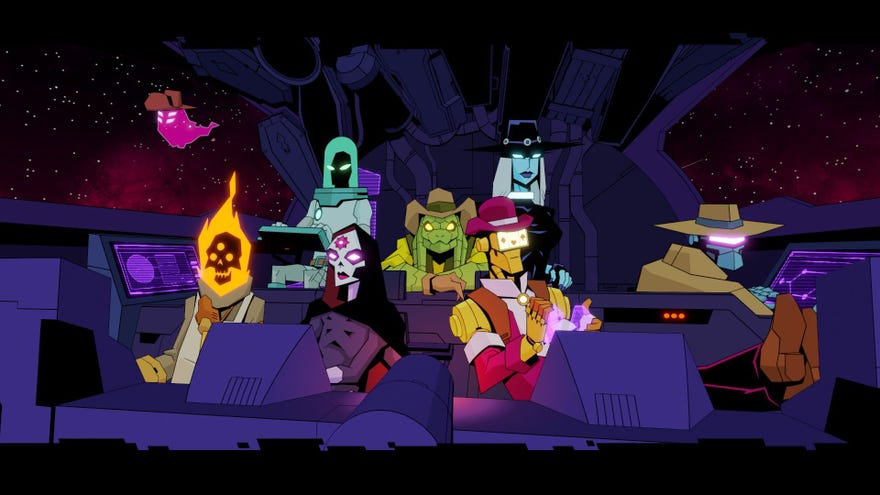Wild Bastards review: a messy roguelike shooter that's nonetheless full o' beans
Some people call me the space cowboy
There are cold opens and there are freezing ones. Sci-fi roguelike shooter Wild Bastards doesn't start on its strongest cowboy boot. You are dumped into the middle of an interstellar chase and summarily shown the ropes. The guns feel simplistic, the arenas bare, the loot vanilla, and the entire loop of beaming down to a planet and getting into small-scale "showdowns" threatens to become stale within the first hour or so. But then you find an outlaw buddy who offers a new way to shoot human dirtbags. Then another fellow bandit. And another. By the time your spaceship is half-filled with scoundrels and weirdoes shouting at each other, the game has warmed up enough to reveal its central idea. This ain't no grand FPS campaign, nor is it quick as roguelikes go. It's a snacky shootout sim with tumbleweed towns that feels best when you savour the pre-fight suspense.
It's rogueishly recognisable in a lot of ways. There's a branching map of planets to visit, each with a planetary surface map filled with nodes and spidery routes to your goal: a special beacon. Getting in your way are blockades of enemies that trigger first-person showdowns. These are relatively short gun fights in randomly generated towns, swamps or mining quarries. Although there are important decisions to make on the planet map, it's the grounded showdowns where all those decisions come to fruition.
As encounters, they have a strong "ghost town" atmosphere. A criminal family of prejudiced humans is desperate to put your gang of mutants 'n' robots in the ground. These enemies (and their pet critters) hide among the shacks, boulders, rooftops, and outhouses, often waiting for you to come close. But they'll routinely give their positions away by yammerin' to each other, a helpful splash of comic book noise visually blinking from the spot they yell from.
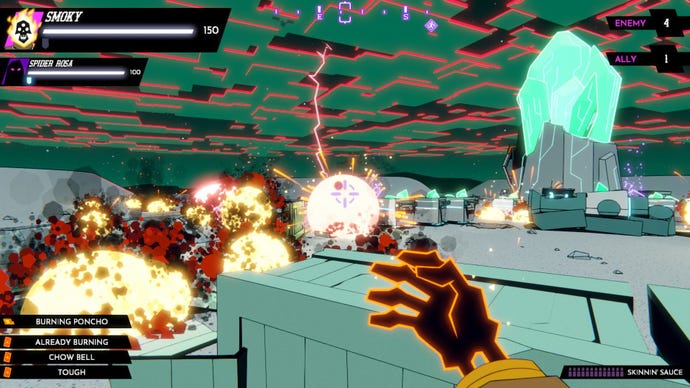
It took a minute to click, but once I understood the game's pace, it worked. The visual hollering is a thematic substitute for the ubiquitous "see through walls" ability that many games use to keep the player informed about enemy whereabouts. It encourages you to stop and listen, to take your time and creep along, without the need to obscure everything else on the screen with a cool blue filter.
It's not the only twist on shootin' doods. For example, your heroes take to the battlefield in pairs, but not side-by-side. Instead, you swap between your two characters at any time. This is basically changing weapons, but said weapon has distinct abilities and its own health bar. Surviving a planet means preserving that health as much as possible between showdowns. You soon learn this is not a frenetic, balls-to-the-wall shooter about sliding around corners or racing from execution animation to execution animation. It's more cautious than that.
There can be frantic showdowns, sure, like the time I was faced with a handful of rocket-launching grizzlies hiding in swamp reeds, while a heap of rooftop bombers rained endless cluster bombs down on me. But more often it's a slower-paced affair. Tense, even. You creep around corners listening out for the tell-tale gurgle of dangerous "porcupines". You walk gingerly into a warren of ruined huts knowing that a trio of shotgun-toting bushwhackers are in there, and they won't come out.
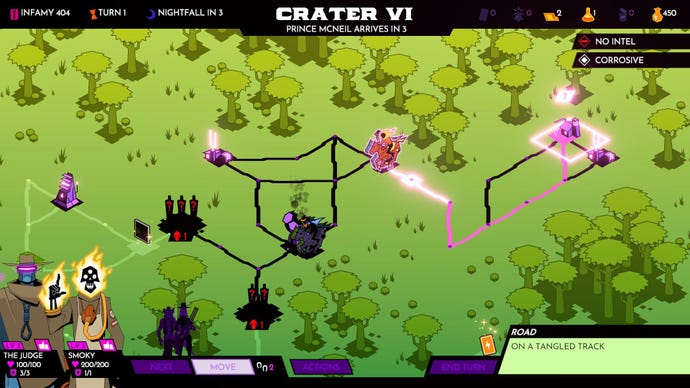
This is Wild Bastards at its most atmospheric, fully embracing the quiet cowboy standoff fantasy. Environmental hazards up the challenge. A swamp planet has toxic pools to avoid, a frozen planet is covered in banks of snow that slow you right down if you trudge through them. On a stormy planet, lightning bolts chase you around, forcing both you and your enemy to take shelter in bubble domes, or brave the open plains with constant movement. You'll often see nightfall arrive, greatly reducing vision for every gunslinger involved.
Back in map world, the planet has shops selling helpful mods. We're talkin' boots that increase your jump height, gun parts that quicken your reload, a poncho that makes you 50% immune to fire. Most are ordinary. But you'll lose all these mods between star systems (every few planets). As a roguelike player, you might hate this. It goes against the expectation set by some roguelikes that the player should accrue goodies until death. I got used to it, but here's a litmus test: if the decaying weapons in Zelda: Breath Of The Wild annoyed you, this probably will too.
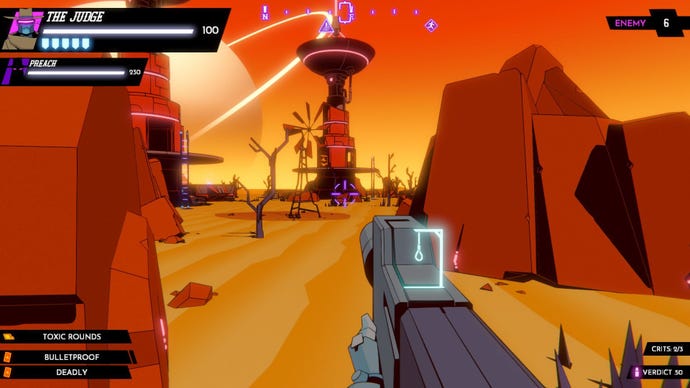
The real goal isn't the accumulation of mods though. It's reaching the end of a star system and finding a coffin containing a new friendly outlaw, like some cadaverous loot box. The starter heroes, pistol wielding Spider Rosa and the shotgun toting Casino, are plain as basic yogurt. But new, permanently unlockable heroes include long-range sniper, The Judge, whose aiming reticule is a steadily doodled game of holographic hangman that adds a line every time you hit a foe (when the hangman is completed, the next shot is an insta-kill). Or the minigun toting Preach, whose ultimate ability heals her while she unloads bullets into bods. The ghostly Kaboom can become temporarily invisible while tossing sticks of dynamite. Smoky shoots fire from his hand, and reloads by counting his own fingers.
Many of the voice actors relish their cowboy roles, fully embracing the "if'ns" and the "guldems" of the western. There are some cracker lines playing on the mash-up of spitoon sci-fi. When an enemy uses his laser eyes to kill The Judge, one outlaw remarks: "It ain't right, zappin' a feller eye-wise." When the irritated Judge is resurrected, he is told to calm down, to stop being so shook up. "I ain't shook up over jack OR shit!" he yells.
It ain't just flavourful language neither. Why, them ne'er-do-wells get into honest-to-god feuds, and downright refuse to work together during showdowns, like what decent folk does. Meaning you gotta resituate yer team compositions and what-have-you. (Hoo-wee, is it hard work keepin' up this here vernacular. God damn.) But that's fine. 'Cause you can find cans o' beans!
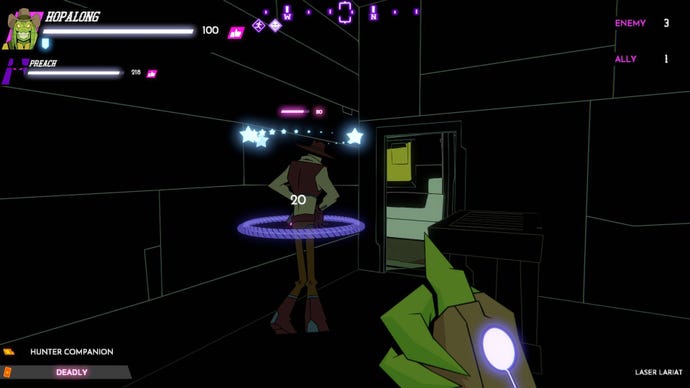
See, you gots to use these here baked beans to dee-fuse any untoward tensions in the gang. Use 'em beans, and them two sumbitches is friends again. (All right. Enough of these gosh-darned linguistic free-volities. I'm tuckered out.)
All this is to say, there are times when you revive an outlaw and, instead of thanking you, he reveals a toxic personality that triggers a horrendous criss-crossing network of feuds. I fell into a fit of laughter just watching all the jagged lines of dislike popping onto the personality graph when this happened to me. Many outlaws would now refuse to beam down together. I didn't care, because it was funny.
Despite the comic companionship, some characters do feel functionally weak. For example, lizard dude Hopalong can incapacitate enemies by holding down his lasso over them, but is slowed to a crawl while doing this. Which means taking on one enemy at a time, or risk being shot while lassoing. Other characters, like the rapid fire plasma-blasting Roswell, feel adaptable and reliable in nearly every encounter. Which means players focused on winning every encounter will lean heavily toward, arguably, the most boring fighters.
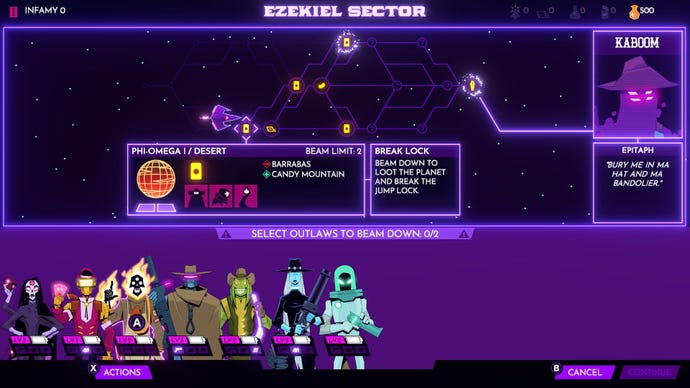
On top of this, some of the ultimate abilities - like Smoky's "Cookout" or Casino's "Roulette" - will simply kill enemies from anywhere on the battlefield, even if you can't see them and don't know where they are. That's useful. But I don't find it satisfying or engaging in a shooter to have a "kill things I can't see" button. It feels like a cop-out that stops you from playing the actual game - run and gun, hide and seek.
Altogether, Wild Bastards pushes some orthodoxies out the window, even while it comfortably settles down with others by the fire. Sometimes it takes an interesting slant - slower gunfights, swappable heroes, equipment decaying at every new star system. Sometimes, though, it's awkward. Default controller settings are deeply stiff and unreliable (I mostly fixed this by turning off "acceleration" and whacking down the "look deadzone"). The user interface often feels bare, clumsy or unusual (why are "new game" and "continue" tucked away in the bottom right corner of the main menu?). And there are strange occurrences I have to assume are bugs: twice I arrived at a fight only to have it auto-resolve as soon as the intro countdown ended.
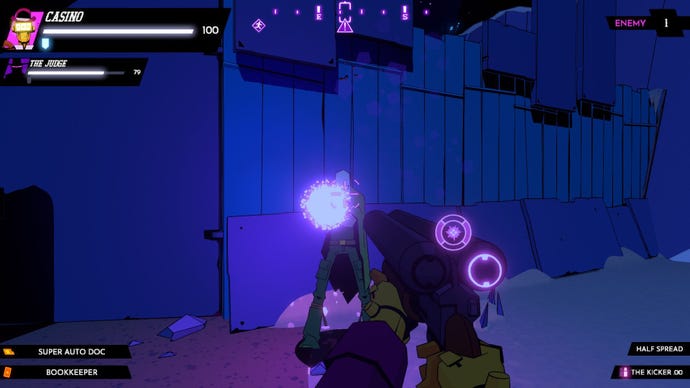
There's a lot more going on. Outlaws can get "scattered" to the wrong location when beamed to planet's surface. Characters can become close pals. You can release a stampede of cows to run around the planet map, battering bad guys. At times, it feels like a messily greedy game, throwing a lot of ideas into its swag bag and running off into the sunset, without necessarily considering whether those ideas ought to exist in the same satchel together.
But my overwhelming impression is of a game that wants to set its own pace, its own "high noon" rhythm. And I quite liked that. As a roguelike its quirks will either endear you to it or make you grimace in mild frustration. Its up-and-down pacing, both on and off the battlefield, makes it hard to recommend to people who like their roguelikes snappy. And while I thoroughly enjoyed the cowboy chatter, it might grate on anyone who wants to hurry up and hit the next showdown. It's a slow burn and the opening hour doesn't communicate the intention particularly well. But as anyone who has really tried cooking beans over a fire can testify, once they're warm, they're just fine.
This review is based on a review build of the game provided by the publisher.